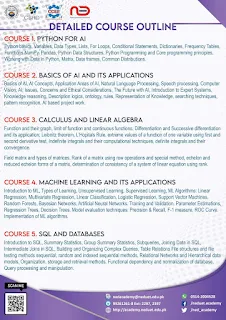Admissions in Artificial Intelligence at NED University
1-YEAR UNDERGRADUATE DIPLOMA IN
ARTIFICIAL INTELLIGENCE
AI FOCAL PERSON
Dr. Najeed Ahmed Khan
Executive Officer
Centre for Software Research & Development, NED University of Engineering Technology
ONLINE REGISTRATION FORM
https://pgadmissions.neduet.edu.pk/ccee/UGD.jsp
https://csrd.neduet.edu.pk/
PROGRAMME DETAILS
5 courses
Duration of Each Course: 7 weeks (1 week of exams)
1 Project of 6 credit hrs
Duration of Project: 16 weeks
Class Timings
2 days per week (Evenings / Weekends)
Commencement
Twice a year (Spring & Fall)
For more details, please visit our website
https://academy.neduet.edu.pk/undergraduate-diploma-programmes
To gain an understanding of how to propose, develop, manage and review major aspects of Artificial Intelligence - in terms of both planning and development.
Through this program students will be able to:
Start the implementation of project with the very important phase of feasibility study.
Develop Data Science & Al project while going through keys stages of modeling & training.
Design test cases to verify the functionality implemented.
DETAILED COURSE OUTLINE
COURSE 1. PYTHON FOR AI
Python basics, Variables, Data Types, Lists, For Loops, Conditional Statements, Dictionaries, Frequency Tables, Functions NumPy, Pandas, Python Data Structures, Python Programming and Core programming principles, Working with Data in Python, Matrix, Data frames, Common Distributions.
COURSE 2. BASICS OF AI AND ITS APPLICATIONS
Basics of Al, Al Concepts, Application Areas of Al, Natural Language Processing, Speech processing, Computer Vision, Al: Issues, Concerns and Ethical Considerations, The Future with Al, Introduction to Expert Systems, Knowledge reasoning, Description logics, ontology, rules, Representation of Knowledge, searching techniques, pattern recognition, Al based project work.
COURSE 3. CALCULUS AND LINEAR ALGEBRA
Function and their graph, limit of function and continuous functions, Differentiation and Successive differentiation and its application; Leibnitz theorem, L'Hopitals Rule, extreme values of a function of one variable using first and second derivative test, Indefinite integrals and their computational techniques, definite integrals and their convergence.
Field matrix and types of matrices, Rank of a matrix using row operations and special method, echelon and reduced echelon forms of a matrix, determination of consistency of a system of linear equation using rank.
COURSE 4. MACHINE LEARNING AND ITS APPLICATIONS
Introduction to ML, Types of Learning, Unsupervised Learning, Supervised Learning, ML Algorithms: Linear Regression, Multivariate Regression, Linear Classification, Logistic Regression, Support Vector Machines, Random Forests, Bayesian Networks, Artificial Neural Networks. Training and Validation, Parameter Estimations, Regression Trees, Decision Trees. Model evaluation techniques: Precision & Recall, F-1 measure, ROC Curve. Implementation of ML algorithms.
COURSE 5. SQL AND DATABASES
Introduction to SQL, Summary Statistics, Group Summary Statistics, Subqueries, Joining Data in SQL, Intermediate Joins in SQL, Building and Organizing Complex Queries, Table Relations File structures and file testing methods sequential, random and indexed sequential methods, Relational Networks and Hierarchical data models, Organization, storage and retrieval methods, Functional dependency and normalization of database, Query processing and manipulation.


Comments
Post a Comment
Thanks for Comments.We will contact soon.